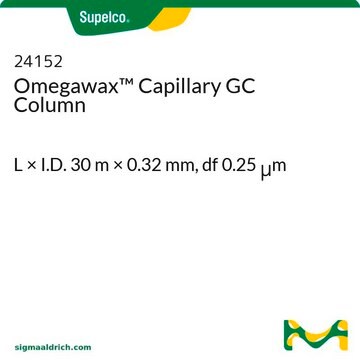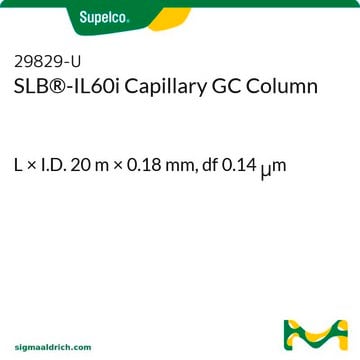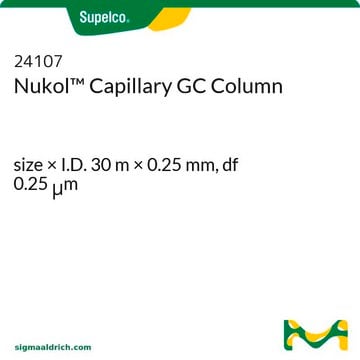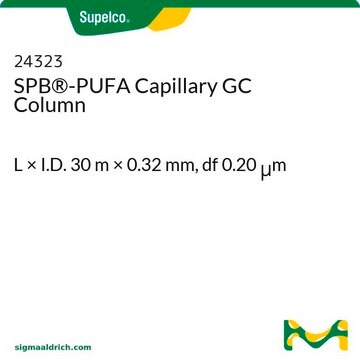23399-U
Omegawax Capillary GC Column
L × I.D. 15 m × 0.10 mm, df 0.10 μm
Sign Into View Organizational & Contract Pricing
All Photos(1)
About This Item
UNSPSC Code:
12352211
eCl@ss:
32119290
NACRES:
SB.54
Recommended Products
material
fused silica
Quality Level
Agency
meets requirements for USP G16
packaging
pkg of 1 ea
parameter
50-280 °C temperature (isothermal or programmed)
Beta value
250
df
0.10 μm
technique(s)
gas chromatography (GC): suitable (fast GC)
L × I.D.
15 m × 0.10 mm
matrix active group
Bonded; poly(ethylene glycol) phase
application(s)
agriculture
biofuels
clinical
food and beverages
column type
capillary polar
Looking for similar products? Visit Product Comparison Guide
General description
Application: This column allows highly reproducible analyses of fatty acid methyl esters (FAMEs), specifically the omega 3 and omega 6 fatty acids. It is tested to ensure reproducible FAME equivalent chain length (ECL) values and resolution of key components.
USP Code: This column meets USP G16 requirements.
Phase:
USP Code: This column meets USP G16 requirements.
Phase:
- Bonded
- Poly(ethylene glycol)
- 50 °C to 280 °C (isothermal or programmed)
Application
Omegawax capillary GC column may be used for herbicide determination using In-tube Solid-phase microextraction (SPME).
Other Notes
We offer a variety of chromatography accessories including analytical syringes
Legal Information
Choose from one of the most recent versions:
Already Own This Product?
Find documentation for the products that you have recently purchased in the Document Library.
Comparison of two gas-liquid chromatograph columns for the analysis of fatty acids in ruminant meat.
Susana P Alves et al.
Journal of chromatography. A, 1216(26), 5130-5139 (2009-05-19)
Two gas-liquid chromatograph capillary columns for the analysis of fatty acids (FA) in ruminant fat are compared. Those columns are the CP-Sil 88 of 100 m long with a highly polar stationary phase and the Omegawax 250 of 30 m
L J Krutz et al.
Journal of chromatography. A, 999(1-2), 103-121 (2003-07-30)
Liquid-liquid extraction or solid-phase extraction followed by gas chromatography (GC) or high-performance liquid chromatography are traditional herbicide residue determination methods for environmental samples. Solid-phase microextraction (SPME) is a solventless, fast, and sensitive alternative herbicide residue extraction method that can be
H Kataoka et al.
Analytical chemistry, 71(19), 4237-4244 (1999-10-12)
The technique of automated in-tube solid-phase microextraction (SPME) coupled with liquid chromatography/electrospray ionization mass spectrometry (LC/ESI-MS) was evaluated for the determination of beta-blockers in urine and serum samples. In-tube SPME is an extraction technique for organic compounds in aqueous samples
M Vecka et al.
Journal of chromatography. B, Analytical technologies in the biomedical and life sciences, 770(1-2), 91-99 (2002-05-16)
Four capillary columns (A: CP-WAX 52 CB 25 m x 0.25 mm; B: CP WAX 52 CB 30 m x 0.25 mm; C: CP-WAX 58 CB 25 m x 0.25 mm, Chrompack; D: OMEGAWAX 320 30 m x 0.32 mm
H Kataoka et al.
Journal of analytical toxicology, 24(4), 257-265 (2000-06-29)
A simple and rapid method for the determination of amphetamine, methamphetamine, and their 3,4-methylenedioxy derivatives in urine samples was developed using automated in-tube solid-phase microextraction (SPME) coupled with liquid chromatography-electrospray ionization mass spectrometry (LC-ESI-MS). In-tube SPME is an extraction technique
Our team of scientists has experience in all areas of research including Life Science, Material Science, Chemical Synthesis, Chromatography, Analytical and many others.
Contact Technical Service






